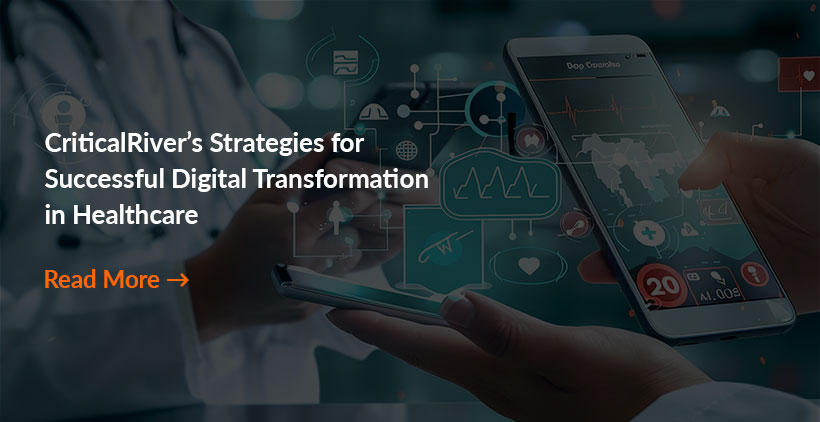
Traditionally the domain of qualified medical professionals who diagnose conditions and prescribe treatments, the healthcare sector has evolved significantly with the increasing use of technology. Today, digital transformation in healthcare enables service providers to understand ailments better, personalize care delivery, and innovate products that sustain disease-free lives to transform patient experiences within and beyond medical facilities. Additionally, automating administrative tasks in hospitals and clinics through digitalization has given healthcare professionals more time to serve ailing individuals efficiently by building an environment of attentiveness and empathy.
Since the pandemic, digital transformation in healthcare has accelerated at an unprecedented speed. Beyond telemedicine, organizations are exploring IT systems to enhance health apps and wearables, remote health monitoring, patient portals, and ambulatory care.
A McKinsey survey found that nearly 90% of the respondents in technical and non-technical roles reported that digital or AI transformation is a top organizational priority. However, 75% of these also expressed their inability to incorporate innovative solutions due to insufficient planning or resources.
A framework to execute digital transformation in healthcare
CriticalRiver recognizes that any transformation can be a complex process. In addition to the high costs of implementing new systems, healthcare providers must ensure data security and privacy, comply with complex industry regulations, and overcome resistance to change.
To overcome such issues, we recommend a multifaceted approach to digital transformation in healthcare with:

Strategic planning
Regularly review and manage innovation portfolios to focus on projects with the highest potential returns. By prioritizing services that require significant overhauls and align with business goals, organizations can concentrate resources effectively, making informed decisions about which solutions to implement first and which to deploy later.

Resource allocation
To overcome resource constraints, healthcare organizations can look for alternative funding sources, such as public-private partnerships or grants for digital transformation in healthcare. A “start small and scale fast” mindset is also effective while implementing digitization initiatives.

Collaboration and partnerships
Partnering with other healthcare entities, technology companies, and academic institutions also helps. Such collaborations facilitate access to technical tools and systems that might be otherwise inaccessible. They also help to resolve interoperability issues and data security concerns. During the pandemic, non-traditional partnerships between healthcare and automotive players in India enabled the rapid development of ventilators and the provision of ambulance services.

Flexibility and agility
Agile methodologies allow healthcare organizations to test and iterate new solutions rapidly. They can launch test versions of innovations, gather user feedback, and make necessary adjustments before full-scale deployment. The approach minimizes the risk of major failures and ensures that all resources are used effectively.

Change management
Healthcare professionals, especially doctors, may resist significant deviations from traditional practices. To mitigate this, organizations should provide training to help staff adapt to new technologies. Upskilling is essential not only for managing new solutions but also for keeping pace with advancements that drive digital transformation in the healthcare industry.
Appointing a chief technology officer is an excellent way to ensure that digital transformation is embedded in the fabric of a healthcare enterprise. Working closely with stakeholders, CTOs are at the forefront of adopting new technologies and exploring solutions that align with the organizational vision.
Benefits of digital transformation in healthcare
Digital technologies allow hospitals to provide patients better access to medical facilities and personalized treatments. The top benefits of digital transformation are:
For physicians and hospital administrators

Improved efficiency and productivity
Cognitive technologies and automation help doctors streamline diagnostic processes. AI-ML algorithms can identify patterns and abnormalities in medical test results, enabling more accurate and tailored treatments. Hospitals can also automate appointment scheduling, electronic health records management, pharmacy stock management, and ERP to increase productivity.

Better data management and accessibility
Moving toward digital transformation, an organization integrates different data sources, making it simpler for doctors to access patient records, diagnostic results, and treatment histories in real time. The connectivity helps to make informed decisions while ensuring that healthcare providers have a comprehensive view of patient care .

Cost benefits
Hospitals adopting digital solutions trim costs by reducing redundancies, optimizing resource allocation, and improving billing. By enabling better remote monitoring and follow-up care, wearable devices and other digital tools also help shorten patients’ stay in hospitals.
For patients

Enhanced experience
With simplified appointment scheduling, automated prescription refill reminders, and digitized access to medical reports, patients get engaging experiences in availing of healthcare services. They can monitor their health and communicate effectively with doctors and helpdesk personnel for timely care, including telemedicine for remote areas.

Better health outcomes
AI and data analytics tools in diagnosing and formulating treatment plans eventually give better clinical results to patients. Doctors can understand symptoms accurately, correlate them to available medical literature, and prescribe the latest medications for safe treatment.
Prioritizing Safety in Healthcare Digital Transformation
Adding a final note to this blog, digital transformation in healthcare has to be handled cautiously, as in any other industry. CriticalRiver advises hospitals and healthcare providers to pair their adoption of advanced technologies with robust cybersecurity measures to protect against data breaches and unauthorized access to sensitive patient information.
Regular audits are crucial to maintaining system integrity and safeguarding against misinformation or fraud, particularly in the age of deepfake technology. As social media content on health tips by influencers increases, patients, too, must resist the temptation for self-medication and consult known specialists for their medical conditions.
To know how CriticalRiver supports digital transformation in healthcare, visit https://www.criticalriver.com/healthcare




